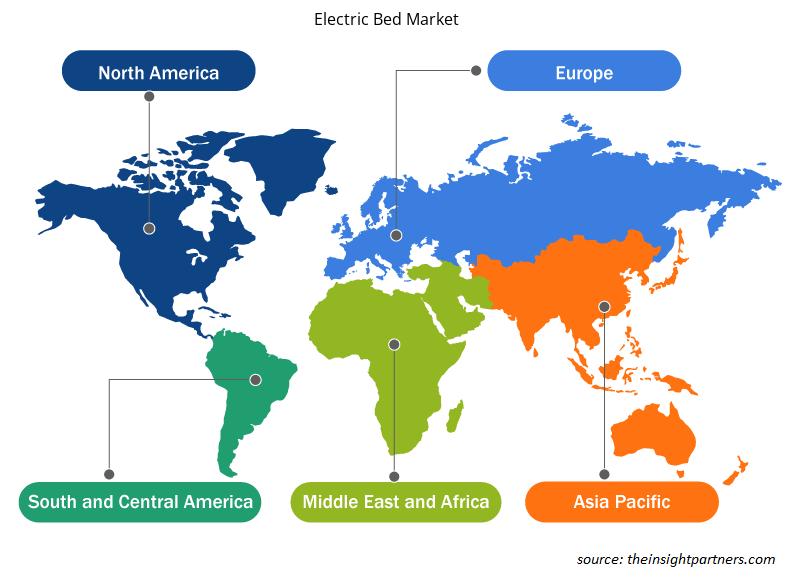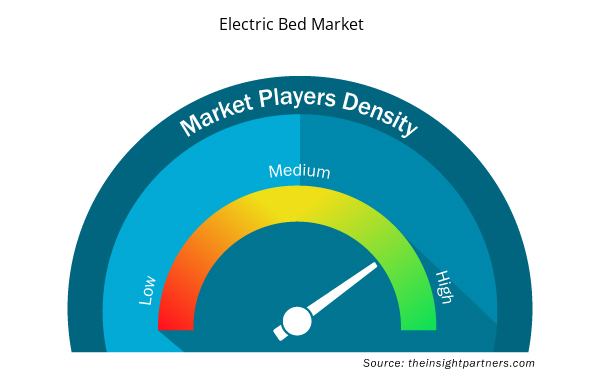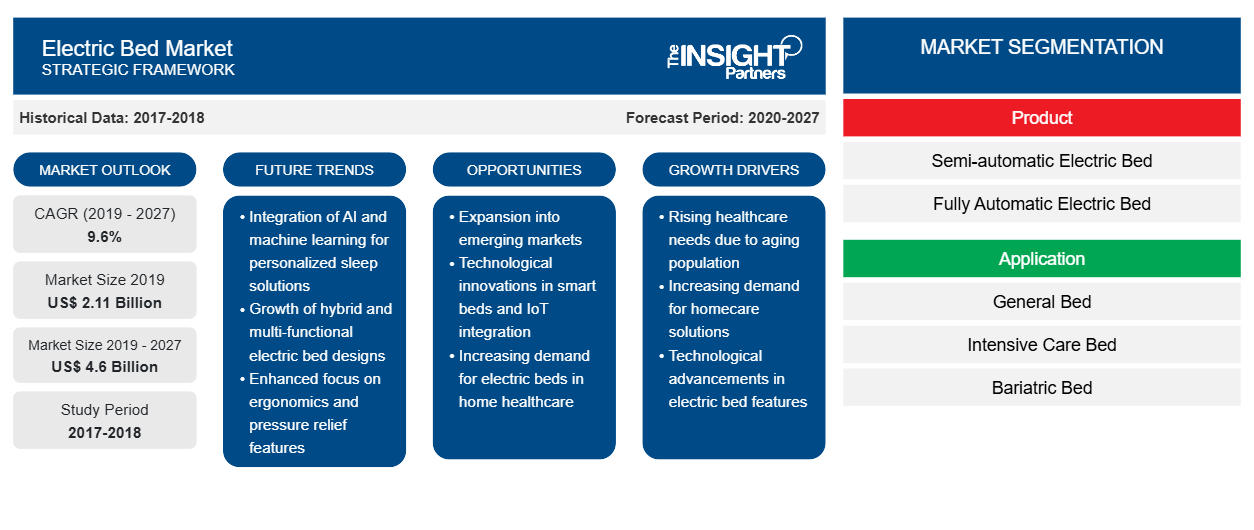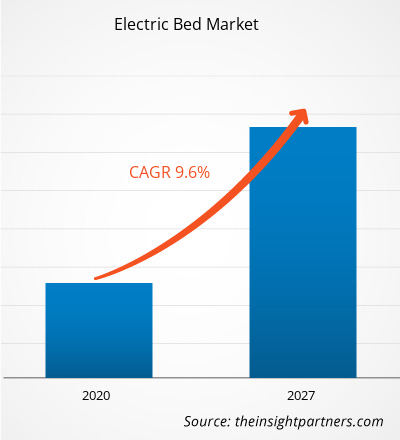Se espera que el mercado de camas eléctricas alcance los 4.597,60 millones de dólares estadounidenses en 2027, frente a los 2.111,59 millones de dólares estadounidenses de 2019. Se estima que el mercado crecerá a una CAGR del 9,6 % entre 2020 y 2027.
El crecimiento del mercado se atribuye a factores impulsores clave como el aumento de la cantidad de enfermedades crónicas, el aumento de la cantidad de hospitales y clínicas y el aumento de la cantidad de asociaciones público-privadas en la industria de la atención médica. Sin embargo, es probable que los altos precios de las camas eléctricas y la reducción de la duración promedio de las estadías hospitalarias obstaculicen el crecimiento del mercado de camas eléctricas .
Perspectivas del mercado
Aumento de la prevalencia de enfermedades crónicas
Las camas se encuentran entre los artículos esenciales que se utilizan en hospitales, residencias de ancianos y entornos de atención domiciliaria. Las camas eléctricas, que se utilizan en diversas aplicaciones, están disponibles en variantes especializadas, como camas de cuidados agudos, camas de cuidados a largo plazo, camas psiquiátricas y camas de embarazo. Los pacientes que padecen enfermedades ortopédicas y musculoesqueléticas tienen movimientos restringidos y carecen de flexibilidad. Las camas eléctricas ofrecen ajustes automáticos con respecto a la colocación de la cabeza, la altura y la posición de descanso de las piernas para estos pacientes. Según la Organización Mundial de la Salud (OMS), las enfermedades musculoesqueléticas contribuyen en gran medida a las discapacidades totales en el mundo. Según la OMS, en 2018, el cáncer fue la segunda causa principal de muerte en todo el mundo, se notificaron ~9,6 millones de muertes en 2018. Además, según las estimaciones de la Sociedad Estadounidense del Cáncer, en 2018 se diagnosticaron 1.735.350 nuevos casos de cáncer. Los pacientes en etapas más avanzadas del cáncer pierden su capacidad para realizar varias tareas fisiológicas por sí mismos, y las camas eléctricas ayudan al personal sanitario a cuidar de estos pacientes.
Así, la creciente prevalencia de enfermedades crónicas como las enfermedades cardiovasculares (ECV), el cáncer y la diabetes incrementan la demanda de camas eléctricas.
Personalice este informe según sus necesidades
Obtendrá personalización en cualquier informe, sin cargo, incluidas partes de este informe o análisis a nivel de país, paquete de datos de Excel, así como también grandes ofertas y descuentos para empresas emergentes y universidades.
- Obtenga las principales tendencias clave del mercado de este informe.Esta muestra GRATUITA incluirá análisis de datos, desde tendencias del mercado hasta estimaciones y pronósticos.
Perspectivas regionales del mercado de camas eléctricas
Los analistas de Insight Partners explicaron en detalle las tendencias y los factores regionales que influyen en el mercado de camas eléctricas durante el período de pronóstico. Esta sección también analiza los segmentos y la geografía del mercado de camas eléctricas en América del Norte, Europa, Asia Pacífico, Oriente Medio y África, y América del Sur y Central.

- Obtenga los datos regionales específicos para el mercado de camas eléctricas
Alcance del informe de mercado de camas eléctricas
| Atributo del informe | Detalles |
|---|---|
| Tamaño del mercado en 2019 | US$ 2.11 mil millones |
| Tamaño del mercado en 2027 | 4.600 millones de dólares estadounidenses |
| CAGR global (2019-2027)CAGR (2019 - 2027) | 9,6% |
| Datos históricos | 2017-2018 |
| Período de pronóstico | 2020-2027 |
| Segmentos cubiertos | Por producto
|
| Regiones y países cubiertos | América del norte
|
| Líderes del mercado y perfiles de empresas clave |
|
Densidad de actores del mercado: comprensión de su impacto en la dinámica empresarial
El mercado de camas eléctricas está creciendo rápidamente, impulsado por la creciente demanda de los usuarios finales debido a factores como la evolución de las preferencias de los consumidores, los avances tecnológicos y una mayor conciencia de los beneficios del producto. A medida que aumenta la demanda, las empresas amplían sus ofertas, innovan para satisfacer las necesidades de los consumidores y aprovechan las tendencias emergentes, lo que impulsa aún más el crecimiento del mercado.
La densidad de actores del mercado se refiere a la distribución de las empresas o firmas que operan dentro de un mercado o industria en particular. Indica cuántos competidores (actores del mercado) están presentes en un espacio de mercado determinado en relación con su tamaño o valor total de mercado.
Las principales empresas que operan en el mercado de camas eléctricas son:
- Dispositivos médicos Arjo
- Compañía: Hill Rom Holding, Inc.
- Industrias Medline, Inc.
- Compañía: Paramount Bed Holdings Co., Ltd.
- Corporación Invacare
Descargo de responsabilidad : Las empresas enumeradas anteriormente no están clasificadas en ningún orden particular.

- Obtenga una descripción general de los principales actores clave del mercado de camas eléctricas
Mercado de camas eléctricas: por producto
- Cama eléctrica semiautomática
- Cama eléctrica totalmente automática
Mercado de camas eléctricas: por aplicación
- Cama general
- Cama de cuidados intensivos
- Cama bariátrica
- Cama de parto
Mercado de camas eléctricas: por usuario final
- Hospitales y Clínicas
- Odontología
- Otros
Mercado de camas eléctricas por geografía
América del norte
- A NOSOTROS
- Canadá
- México
Europa
- Francia
- Alemania
- Italia
- Reino Unido
- España
- Resto de Europa
Asia Pacífico (APAC)
- Porcelana
- India
- Corea del Sur
- Japón
- Australia
- Resto de Asia Pacífico
Oriente Medio y África (MEA)
- Sudáfrica
- Arabia Saudita
- Emiratos Árabes Unidos
- Resto de Oriente Medio y África
América del Sur y Central
- Brasil
- Argentina
- Resto de América del Sur y Central
Perfiles de empresas
- Dispositivos médicos Arjo
- Compañía: Hill Rom Holding, Inc.
- Industrias Medline, Inc.
- Compañía: Paramount Bed Holdings Co., Ltd.
- Corporación Invacare
- Corporación Stryker
- Balneario Malvestio
- Línea
- Gendron Inc.
- Joerns Salud LLC
- Análisis histórico (2 años), año base, pronóstico (7 años) con CAGR
- Análisis PEST y FODA
- Tamaño del mercado Valor/volumen: global, regional, nacional
- Industria y panorama competitivo
- Conjunto de datos de Excel


- Predictive Maintenance Market
- Airport Runway FOD Detection Systems Market
- Constipation Treatment Market
- Mail Order Pharmacy Market
- Green Hydrogen Market
- Greens Powder Market
- 3D Mapping and Modelling Market
- Retinal Imaging Devices Market
- Lyophilization Services for Biopharmaceuticals Market
- Personality Assessment Solution Market

Report Coverage
Revenue forecast, Company Analysis, Industry landscape, Growth factors, and Trends

Segment Covered
This text is related
to segments covered.

Regional Scope
North America, Europe, Asia Pacific, Middle East & Africa, South & Central America

Country Scope
This text is related
to country scope.
Preguntas frecuentes
Global electric bed market is segmented by region into North America, Europe, Asia Pacific, Middle East & Africa and South & Central America. In North America, the U.S. is the largest market for electric beds. Increasing number of aging population, increasing number of hospitalizations, and technological advancements by key players in electric bed market. The Asia Pacific region is expected to account for the fastest growth in the electric bed market. In Japan and South Korea, the market is expected to grow owing to the development of the healthcare systems and proliferating medical tourism.
Electric beds are beds, which allow adjusting both the upper and lower body positions and adjusting the height of the bed itself. They may help a variety of medical complaints and exponentially increase comfort. Many medical conditions can actually be worsened by poor sleep quality and uncomfortable sleeping positions.
The rise in number of chronic diseases, increasing number of hospitals and clinics and increase in number of public-private partnership in healthcare industry are the factors driving the market growth. However, the steep prices of electric beds and reduction in average length of hospital stays are likely to hinder the market growth.
Trends and growth analysis reports related to Consumer Goods : READ MORE..
The List of Companies - Electric Bed Market
- Arjo Medical Devices
- Hill Rom Holding, Inc.
- Medline Industries, Inc.
- Paramount Bed Holdings Co., Ltd.
- Invacare Corporation
- Stryker Corporation
- Malvestio Spa
- LINET
- Gendron Inc.
- Joerns Healthcare LLC
The Insight Partners performs research in 4 major stages: Data Collection & Secondary Research, Primary Research, Data Analysis and Data Triangulation & Final Review.
- Data Collection and Secondary Research:
As a market research and consulting firm operating from a decade, we have published and advised several client across the globe. First step for any study will start with an assessment of currently available data and insights from existing reports. Further, historical and current market information is collected from Investor Presentations, Annual Reports, SEC Filings, etc., and other information related to company’s performance and market positioning are gathered from Paid Databases (Factiva, Hoovers, and Reuters) and various other publications available in public domain.
Several associations trade associates, technical forums, institutes, societies and organization are accessed to gain technical as well as market related insights through their publications such as research papers, blogs and press releases related to the studies are referred to get cues about the market. Further, white papers, journals, magazines, and other news articles published in last 3 years are scrutinized and analyzed to understand the current market trends.
- Primary Research:
The primarily interview analysis comprise of data obtained from industry participants interview and answers to survey questions gathered by in-house primary team.
For primary research, interviews are conducted with industry experts/CEOs/Marketing Managers/VPs/Subject Matter Experts from both demand and supply side to get a 360-degree view of the market. The primary team conducts several interviews based on the complexity of the markets to understand the various market trends and dynamics which makes research more credible and precise.
A typical research interview fulfils the following functions:
- Provides first-hand information on the market size, market trends, growth trends, competitive landscape, and outlook
- Validates and strengthens in-house secondary research findings
- Develops the analysis team’s expertise and market understanding
Primary research involves email interactions and telephone interviews for each market, category, segment, and sub-segment across geographies. The participants who typically take part in such a process include, but are not limited to:
- Industry participants: VPs, business development managers, market intelligence managers and national sales managers
- Outside experts: Valuation experts, research analysts and key opinion leaders specializing in the electronics and semiconductor industry.
Below is the breakup of our primary respondents by company, designation, and region:

Once we receive the confirmation from primary research sources or primary respondents, we finalize the base year market estimation and forecast the data as per the macroeconomic and microeconomic factors assessed during data collection.
- Data Analysis:
Once data is validated through both secondary as well as primary respondents, we finalize the market estimations by hypothesis formulation and factor analysis at regional and country level.
- Macro-Economic Factor Analysis:
We analyse macroeconomic indicators such the gross domestic product (GDP), increase in the demand for goods and services across industries, technological advancement, regional economic growth, governmental policies, the influence of COVID-19, PEST analysis, and other aspects. This analysis aids in setting benchmarks for various nations/regions and approximating market splits. Additionally, the general trend of the aforementioned components aid in determining the market's development possibilities.
- Country Level Data:
Various factors that are especially aligned to the country are taken into account to determine the market size for a certain area and country, including the presence of vendors, such as headquarters and offices, the country's GDP, demand patterns, and industry growth. To comprehend the market dynamics for the nation, a number of growth variables, inhibitors, application areas, and current market trends are researched. The aforementioned elements aid in determining the country's overall market's growth potential.
- Company Profile:
The “Table of Contents” is formulated by listing and analyzing more than 25 - 30 companies operating in the market ecosystem across geographies. However, we profile only 10 companies as a standard practice in our syndicate reports. These 10 companies comprise leading, emerging, and regional players. Nonetheless, our analysis is not restricted to the 10 listed companies, we also analyze other companies present in the market to develop a holistic view and understand the prevailing trends. The “Company Profiles” section in the report covers key facts, business description, products & services, financial information, SWOT analysis, and key developments. The financial information presented is extracted from the annual reports and official documents of the publicly listed companies. Upon collecting the information for the sections of respective companies, we verify them via various primary sources and then compile the data in respective company profiles. The company level information helps us in deriving the base number as well as in forecasting the market size.
- Developing Base Number:
Aggregation of sales statistics (2020-2022) and macro-economic factor, and other secondary and primary research insights are utilized to arrive at base number and related market shares for 2022. The data gaps are identified in this step and relevant market data is analyzed, collected from paid primary interviews or databases. On finalizing the base year market size, forecasts are developed on the basis of macro-economic, industry and market growth factors and company level analysis.
- Data Triangulation and Final Review:
The market findings and base year market size calculations are validated from supply as well as demand side. Demand side validations are based on macro-economic factor analysis and benchmarks for respective regions and countries. In case of supply side validations, revenues of major companies are estimated (in case not available) based on industry benchmark, approximate number of employees, product portfolio, and primary interviews revenues are gathered. Further revenue from target product/service segment is assessed to avoid overshooting of market statistics. In case of heavy deviations between supply and demand side values, all thes steps are repeated to achieve synchronization.
We follow an iterative model, wherein we share our research findings with Subject Matter Experts (SME’s) and Key Opinion Leaders (KOLs) until consensus view of the market is not formulated – this model negates any drastic deviation in the opinions of experts. Only validated and universally acceptable research findings are quoted in our reports.
We have important check points that we use to validate our research findings – which we call – data triangulation, where we validate the information, we generate from secondary sources with primary interviews and then we re-validate with our internal data bases and Subject matter experts. This comprehensive model enables us to deliver high quality, reliable data in shortest possible time.


 Obtenga una muestra gratuita de este informe
Obtenga una muestra gratuita de este informe